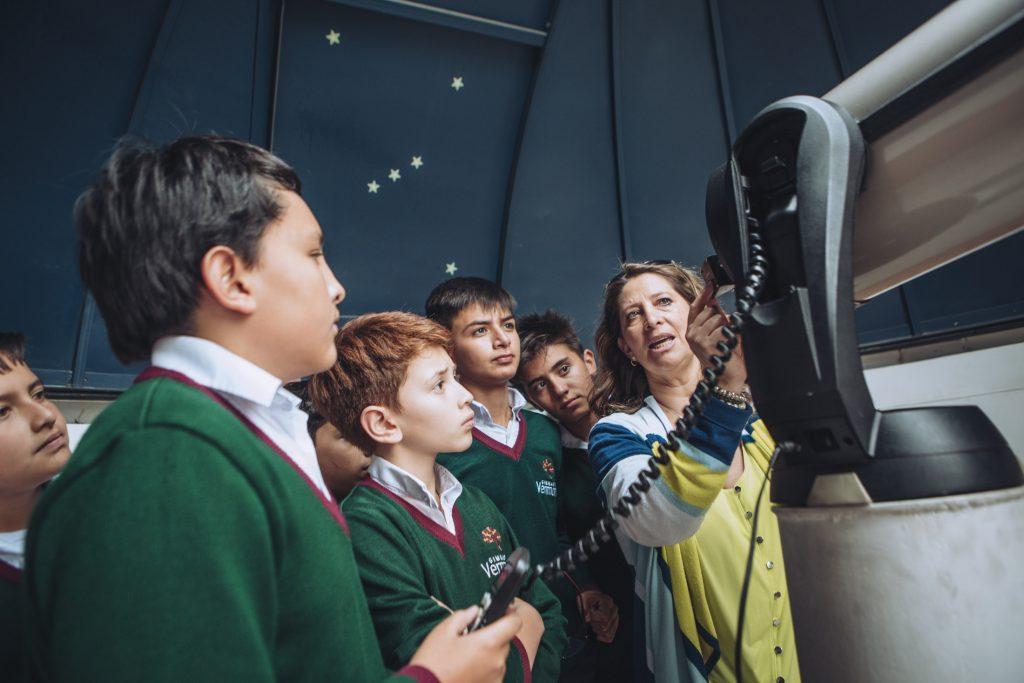
What is pedagogical accompaniment?
According to the experience of the National Ministry of Education, in relation to the pedagogical accompaniment in Educational Establishments, at their institutional and classroom levels, as well as in Secretaries of Education, it is conceived as a systematic and permanent process of cooperative work between peers, external agents, or educational community, which focuses on the study of practices based on observation, pedagogical reflection, design, implementation and monitoring of improvement strategies, and has as its main objective the pedagogical and curricular strengthening for the benefit of the learning processes of all students.

The Department of Research and Professional Development at Gimnasio Vermont, led by the Viceprincipal, uses the interview format to present the purposes and objectives of its programs.
¿What is the Gimnasio Vermont Professional Research and Development program?
It is a program that was born thanks to the research carried out at GV from 2014 to 2016. The central axis of this research sought how to generate an educational change, while preserving the successful practices of the institution, as well as creating spaces for innovation from the work with the teachers.
¿What was the result?
The result was very positive because a group made up of teachers, led by the Vice Principal, was created, with the aim of discussing educational issues, reflecting based on problems related to the academia at GV, and executing projects in the school.
¿Who make up the group at the moment?
Year after year, teachers from all areas are nominated, of which 4 are selected. In this process, each teacher proposes a line of research, which culminates in a publication article or a project implemented at GV.
During the research year, what was the biggest challenge?
One of the main challenges with teachers is psychological isolation (Sarason, 1996). To get out of this isolation, in the Department we do educational coaching.
¿Could you give an example of what educational coaching is?
All professions have a mentoring process. A heart surgeon does not graduate and the next day is operating, he continues with a teaching process in practice. This happens with lawyers, administrators and many more. Professionals in education graduate, and in August or January they are hired; they are usually given a curriculum and the schedule of the classes that they must teach. Those who continue in the profession, most of their time, work with minors and lack or have very few spaces to share with peers and reflect on their work. This is the psychological isolation to which they are exposed.
¿What is the relationship that teachers have with coaching?
Every year, the 4 coaches accompany teachers who want to open the door of their classroom and share their experiences; those who accept this opportunity to learn, take risks and venture to give classes in a different way than they had been doing.
¿What is the relationship that teachers have with coaching?
Change takes time. The first year was a year of many learnings, of understanding how the entire process is mediated by human relationships and only when there is connection, trust and empathy, the teacher is really willing to present their questions.
¿What changes arose from the formulation of the questions?
With respect to the teaching practice, to the way or ways in which we questions others and question ourselves. To give an example, an interesting case was the work we did with the Transition reading teaching method: the coach questioned whether the global method of teaching reading in English in the Early Immersion Program was the best for all the students. We started the research work in 2017-2018, implementing some pilots regarding mixed reading-writing methods. We implemented this project after doing a thesis whose research dealt with different reading-writing methods. In 2018-2019 we made the method change and since then we have constantly made adjustments.
The results showed better spelling, students can read each letter of a word and discover new words. Fluency was increased, that is, reading speed and they found other strategies to read a text. Another change that was implemented in this project is the work with inferences, projections, importance of events and their relevance in the text. Also, the connection of the events with their personal experiences. In writing we observe a more spontaneous and creative approach, students can build from their experience. Under the old model, students wrote from the writing patterns they were taught. One of the most significant transformations is that we now address all four language skills, listening, speaking, reading and writing in one class.